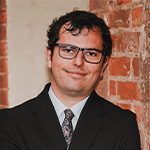Why did you choose a job in this profession?
I’ve always been interested in how things work and I love to learn as much as possible about state-of-the-art applications of science in technology. Therefore, a job where I have to learn about different new technologies every single day is a natural fit for my interests.
This job is not just about technology, however, and the idea of diving into the world of intellectual property law also intrigued me. Being from a scientific background, moving to an entirely new field represented a new and exciting challenge for me.
What are your main duties?
As a newly hired trainee my main duty is to respond to official communications from patent offices with the guidance of senior attorneys.
During the process of prosecuting a patent application, a patent office will issue official examination reports in which they assess the patentability of the application on keys points such as: novelty (whether the invention has already been disclosed), inventiveness (whether a non-obvious step has been made in the development of the technology) and clarity (whether the patent application itself is easy to make sense of to a skilled person).
In response to these reports, I have to carefully compare the patent application to existing technology and formulate arguments as to why the patent application should be granted. This involves using fine analytical skills and requires a solid base of technological knowledge. Often, the differences between technologies are subtle and hinge around one or two inventive features. I have to then formulate my arguments to the patent office in a persuasive manner, which requires a good grasp of written English.
As I progress in my career, I will move towards other things such as drafting patent applications, working even more closely with clients to help to develop and protect their intellectual property portfolios, and developing the business itself by generating interest in our services through networking.
Do you have any advice for anyone wanting to enter the profession?
Be prepared for a tough interview process. The interviews for trainees in this profession involve several stages and will assess you on your technological knowledge, organisational skills, verbal and written communication skills and personality.
Learn as much as you can about the companies you are applying to before applying, and don’t be disheartened if it takes some time to find the right fit. This is a difficult profession to enter, but if you have the right skills and determination, you will find a role eventually.
This profession also involves sitting many qualification exams in the first 4-6 years, which in turn involves studying in your free time outside of the office. Make sure you are happy with this commitment before embarking on this career path.
My final piece of advice would be to speak to someone within the profession, especially current trainees. They can provide you a realistic idea of what to expect and will be able to answer any specific questions you may have about what this career involves.







